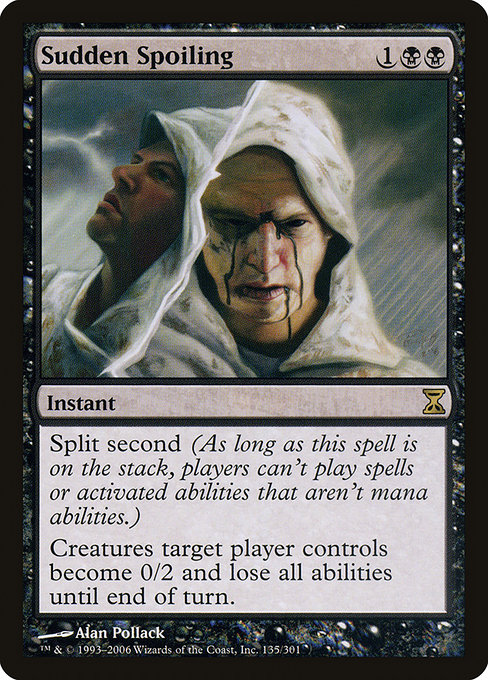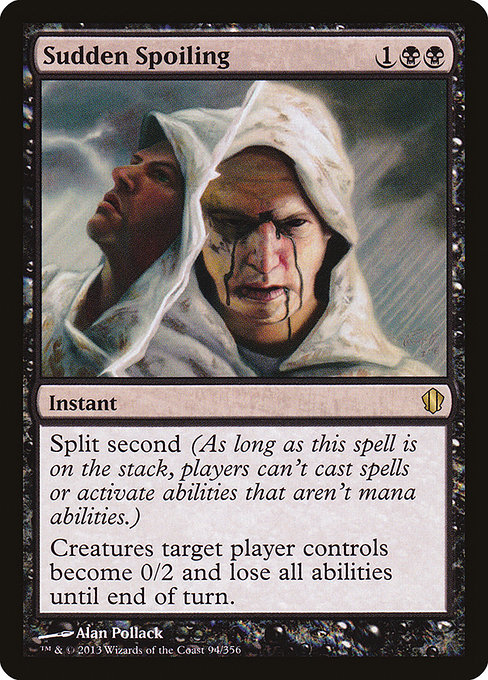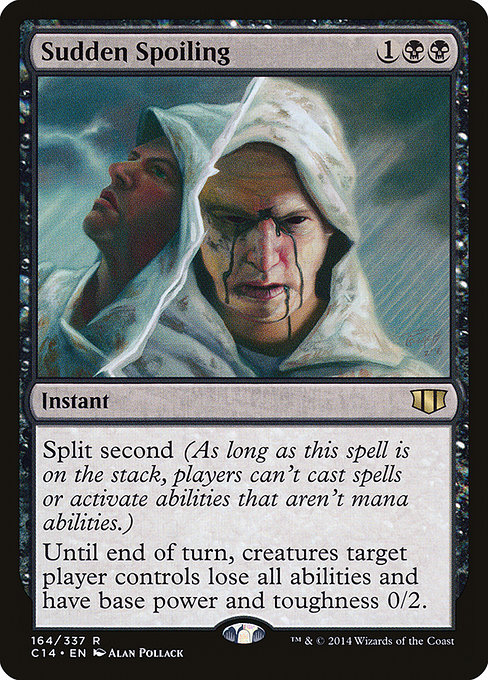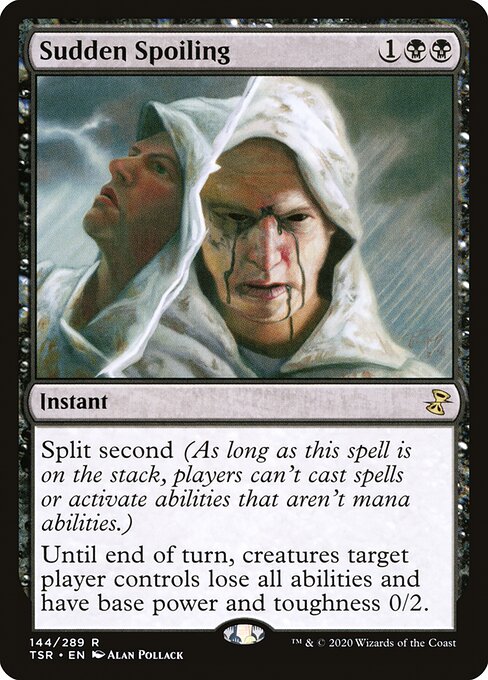standard
future
historic
gladiator
pioneer
explorer
modern
legacy
pauper
vintage
penny
commander
brawl
alchemy
paupercommander
duel
oldschool
premodern
Rulings
Sudden Spoiling affects only creatures the target player controls at the time it resolves. Creatures they begin to control later in the turn won’t change power and toughness or lose abilities.
If the resolution of a triggered ability involves casting a spell, that spell can’t be cast if a spell with split second is on the stack.
Casting a spell with split second won’t affect spells and abilities that are already on the stack.
Split second doesn’t stop triggered abilities from triggering, such as that of Chalice of the Void. If one does, its controller puts it on the stack and chooses targets for it, if any. Those abilities will resolve as normal.
After a spell with split second resolves (or otherwise leaves the stack), players may again cast spells and activate abilities before the next object on the stack resolves.
Sudden Spoiling overwrites any effects that set a creature’s power and toughness. Any existing effects or counters that raise, lower, or switch a creature’s power and/or toughness continue to apply to the creature’s newly-set power and toughness.
Players may turn face-down creatures face up while a spell with split second is on the stack.
Players still get priority while a card with split second is on the stack; their options are just limited to mana abilities and certain special actions.
If the resolution of a triggered ability involves casting a spell, that spell can’t be cast if a spell with split second is on the stack.
Casting a spell with split second won’t affect spells and abilities that are already on the stack.
Split second doesn’t stop triggered abilities from triggering, such as that of Chalice of the Void. If one does, its controller puts it on the stack and chooses targets for it, if any. Those abilities will resolve as normal.
After a spell with split second resolves (or otherwise leaves the stack), players may again cast spells and activate abilities before the next object on the stack resolves.
Sudden Spoiling overwrites any effects that set a creature’s power and toughness. Any existing effects or counters that raise, lower, or switch a creature’s power and/or toughness continue to apply to the creature’s newly-set power and toughness.
Players may turn face-down creatures face up while a spell with split second is on the stack.
Players still get priority while a card with split second is on the stack; their options are just limited to mana abilities and certain special actions.
Rulings
Sudden Spoiling affects only creatures the target player controls at the time it resolves. Creatures they begin to control later in the turn won’t change power and toughness or lose abilities.
If the resolution of a triggered ability involves casting a spell, that spell can’t be cast if a spell with split second is on the stack.
Casting a spell with split second won’t affect spells and abilities that are already on the stack.
Split second doesn’t stop triggered abilities from triggering, such as that of Chalice of the Void. If one does, its controller puts it on the stack and chooses targets for it, if any. Those abilities will resolve as normal.
After a spell with split second resolves (or otherwise leaves the stack), players may again cast spells and activate abilities before the next object on the stack resolves.
Sudden Spoiling overwrites any effects that set a creature’s power and toughness. Any existing effects or counters that raise, lower, or switch a creature’s power and/or toughness continue to apply to the creature’s newly-set power and toughness.
Players may turn face-down creatures face up while a spell with split second is on the stack.
Players still get priority while a card with split second is on the stack; their options are just limited to mana abilities and certain special actions.
If the resolution of a triggered ability involves casting a spell, that spell can’t be cast if a spell with split second is on the stack.
Casting a spell with split second won’t affect spells and abilities that are already on the stack.
Split second doesn’t stop triggered abilities from triggering, such as that of Chalice of the Void. If one does, its controller puts it on the stack and chooses targets for it, if any. Those abilities will resolve as normal.
After a spell with split second resolves (or otherwise leaves the stack), players may again cast spells and activate abilities before the next object on the stack resolves.
Sudden Spoiling overwrites any effects that set a creature’s power and toughness. Any existing effects or counters that raise, lower, or switch a creature’s power and/or toughness continue to apply to the creature’s newly-set power and toughness.
Players may turn face-down creatures face up while a spell with split second is on the stack.
Players still get priority while a card with split second is on the stack; their options are just limited to mana abilities and certain special actions.
Your collection? Your decks?
Want to manage your collection and/or create decks?



 0
0
 1.59€
1.59€

